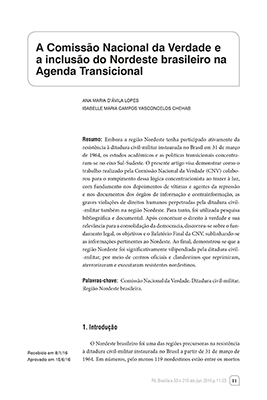O Poder Judiciário e as leis de anistia latino-americanas: as experiências da Argentina, Chile e Brasil
Dionis Mauri Penning Blank
Eugênio Facchini Neto
Resumo
A Argentina, o Brasil e o Chile vivenciaram regimes ditatoriais durante parte da segunda metade do século XX. Militares derrubaram governos legitimamente constituídos, efetuaram perseguições políticas, suspenderam garantias individuais, torturaram e mataram opositores do regime. Ao final do ciclo autocrático, foram aprovadas leis de anistia que procuraram suavizar o início da transição democrática e evitar revanchismos. Este artigo tem por objetivo identificar as diferenças na aplicação judicial dessas leis naqueles três países. Na Argentina, as leis de anistia foram declaradas inconstitucionais por sua Corte Suprema, o que não ocorreu no Brasil, nem no Chile. Neste último, porém, a jurisprudência enveredou pelo caminho de sua desaplicação ou, no mínimo, de uma aplicação moderada. A primeira parte do trabalho analisa a violação de direitos humanos durante os regimes autoritários e a segunda analisa como foram concebidas as leis de anistia e o papel do Poder Judiciário na sua implementação.
Palavras-chave
Regime militar. Argentina. Brasil. Chile. Anistia.
Título, resumo e palavras-chave em inglês
The Judiciary and Latin American amnesty laws: the experiences of Argentina, Chile and Brazil
Argentina, Brazil, and Chile experienced dictatorial regimes during part of the second half of the twentieth century. The military overthrew legitimately constituted governments, suspended individual guarantees, tortured and killed opponents of the regime. At the end of the autocratic cycle, amnesty laws were approved seeking to soften the beginning of the democratic transition and avoid revenge feelings. The purpose of this article is to identify differences in the judicial application of these laws in those three countries. Argentine amnesty laws were declared unconstitutional by the Supreme Court of Argentina, which did not occur in the Brazilian or Chilean experience. In the latter country, however, jurisprudence has gone the way of its moderate application. The first part analyzes the violation of human rights by authoritarian regimes, while the second part analyzes how the amnesty laws were conceived and the role of the Judiciary in its implementation.
Military regime. Argentina. Brazil. Chile. Amnesty laws.
Como citar este artigo
(ABNT)
BLANK, Dionis Mauri Penning; FACCHINI NETO, Eugênio. O Poder Judiciário e as leis de anistia latino-americanas: as experiências da Argentina, Chile e Brasil. Revista de Informação Legislativa: RIL, Brasília, DF, v. 56, n. 224, p. 11-36, out./dez. 2019. Disponível em: http://www12.senado.leg.br/ril/edicoes/56/224/ril_v56_n224_p11
(APA)
Blank, D. M. P., & Facchini, E., Neto (2019). O Poder Judiciário e as leis de anistia latino-americanas: as experiências da Argentina, Chile e Brasil. Revista de Informação Legislativa: RIL, 56(224), 11-36. Recuperado de http://www12.senado.leg.br/ril/edicoes/56/224/ril_v56_n224_p11
